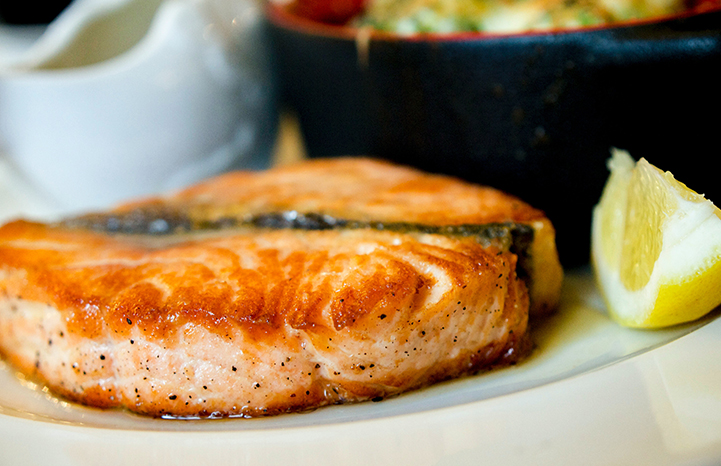FOOTBALL
Football is a game of strength and speed dominated by short bursts of high-intensity exercise (1). This type of sport requires immediate fuel (carbohydrate) availability for muscle strength and power while also providing enough protein in the diet to build muscle. Players must eat to provide their body appropriate fuel whether they are lean and quick receivers or power-driven linemen.
Jennifer DeWall RDN, CSSD, LD
Jennifer works with ICYF to provide expert advice on sports nutrition and healthy eating to the student and families of Indianola. A registered dietitian/nutritionist, Jennifer owns a private practice that focuses on helping athletes stay on the cutting edge with superior nutrition.
Nutrition Recommendations for Football Players
Eat six times per day.
To keep energy levels high and to ensure adequate calorie intake, eating six times per day is ideal. Eat a combination of carbohydrates and lean protein. An intake of 5-7 grams of carbohydrate per kilogram of body weight per day (430-600 grams) should cover most athletes. A protein intake of about 1.5 grams per kilogram of body weight per day (120-130 grams) is an ideal level of protein. Keep in mind these are general scientific guidelines. It is best to work with a sports nutritionist to determine your exact nutrition requirements.
Your snacks and carbohydrate intake should be timed appropriately before and after trainings to maximize performance and promote faster recovery without added calories. A list of snack ideas before training can be found on the ICYF “On the Go Snacks for Athletes” guide.
Additionally, it is important to select lean cuts of meat, low-fat and fat free dairy products, fresh fruits and vegetables as well as whole grain products that are good sources of fiber to promote satiety. A more detailed list of products can be found on the ICYF “Athlete Shopping List” guide.

Eat “good” fats
With high energy requirements, it is easy to feel as though you can eat whatever you want. For optimal performance, it is important that you still limit the amount of fried food, fast food and greasy pizza you consume. Greasy fatty foods will slow speed and recovery. Focus more on getting your fats from peanut butter or other nut butters, hummus, plain peanuts, almonds, cashews or other nuts, fish, olive oil-based salad dressings and spreads.
Eat within 30 minutes of competition and training to speed recovery time
Players engaged in the full 48 minutes of a game will put a significant drain on their muscle glycogen (fuel) stores. To promote rapid recovery and muscle growth/ repair, consume a carbohydrate and protein rich snack within 30 minutes after play. Low-fat chocolate milk, ready to consume nutritional drinks such as Ensure or a sports drink with peanut butter crackers are good combinations. For a more complete list of ideas see the ICYF “On the Go Snacks for Athletes” guide.
Eat protein AND carbohydrate to gain muscle
If your goal is to gain muscle mass, it is critical that you increase your overall energy intake. Some high school football players may need over 4000 calories a day! A proper balance of carbohydrate, protein and fat is still required. High protein diets do not build muscle faster and should be avoided. Research shows eating more than 1 gram of protein per pound of bodyweight can result in dehydration, kidney damage and poor performance. Too much protein and not enough carbohydrate will cause your body to utilize muscle reserves for energy instead of building bulk. Consuming adequate carbohydrates will allow readily available fuel for your muscles to help maintain and increase muscle mass.
In summary, do NOT follow a reduced carbohydrate diet to gain muscle. Good sources of carbohydrate to facilitate muscle development can be found on the ICYF “Athlete Shopping List” guide.
Be cautious of supplements
Supplements are not a substitute for adequate eating. The supplement industry is not well regulated and allows supplements to be on store shelves until proven harmful. This means there are many supplements out there that could hurt you and your ability to play football. To read more about supplements that can help performance and supplements that may hinder, see the ICYF “The Scoop on Supplements” guide.
STAY HYDRATED
Hydration before, during and after training and game-time should be well planned, especially given the typical summertime climate. Drinking large amounts of water in the minutes beforehand is not an optimal way to hydrate and can leave you with a “sloshy” stomach in the opening minutes of play. Dehydration (2-3% loss in body weight (1) or just a bit over 3 pounds for a 165-pound player) can slow pace and decrease reaction time. Players should sip small amounts of fluid during training and regularly throughout the day.

HYDRATION TIPS
• Start hydrating about 4 hours before practice or competitions so that you are able to excrete any excess fluid as urine before you compete.
• If you are training for 60+ minutes, sip 4-6 ounces fluid every 15 minutes. A sports drink may be necessary.
• On days where you are training intensely, for every pound lost, replace with 24 ounces of fluid.
• Carry a water bottle with you during the day to help achieve your fluid goals. One sip of water is equal to about 1 ounce.
Hydration during practices and games is also critical. If you are playing for more than 60 minutes then a sports beverage may be needed. Sports beverages can allow you to keep your blood sugar levels within normal limits to allow for immediate energy and split-second decision making. Your brain relies on glucose for its primary fuel source. Without (glucose,) your blood sugar can drop and cause impaired mental acuity.
In order to play at your optimal level, clean eating, a healthy weight and hydration are your secret weapons to winning. For more information or a personalized plan, work with a registered dietitian/nutritionist that is board certified in sports dietetics.
References
1. Australian Government. Australian Sports Commission. www.ausport.gov.au August 2013.
2. Dunford, Marie. Sports Nutrition. A Practical Manual for Professionals. 4th Edition. American Dietetic Association, 2006.
3. Position of the American Dietetic Association, Dietitians of Canada, and the American College of Sports Medicine: Nutrition and Athletic Performance. Journal of the American Dietetic Association, March 2009, Volume 109 Number 3 p. 509-522.
Additional suggestions for football players
While most athletes talk about losing weight, what they actually want to achieve is a decrease in body fat. Due to differences in physical demands of baseball players, pitchers and catchers will tend to be heavier than infielders. Outfielders are typically the leanest individuals. However, these are general guidelines. Everyone must find what body composition works best for them to be an optimal player.
The true goal is to lose body fat while preserving muscle mass. Body weight is a poor measure of the amount of fat we carry and changes measured on the scales do not necessarily reflect changes in body fat stores. Using a variety of pre-determined measurement sites for testing body composition will provide a better overall picture of changes.
When aiming to lower body fat, there are no quick fixes that are sustainable. A long-term approach is required to lower body fat levels while maintaining the ability to train effectively. Therefore, changes in body composition are meant to be done in the off-season. The ultimate goal is to adjust your energy balance between calorie intake and your off-season fitness routine. Work with a sports dietitian/nutritionist to create an ideal food plan to fit your individual needs.

